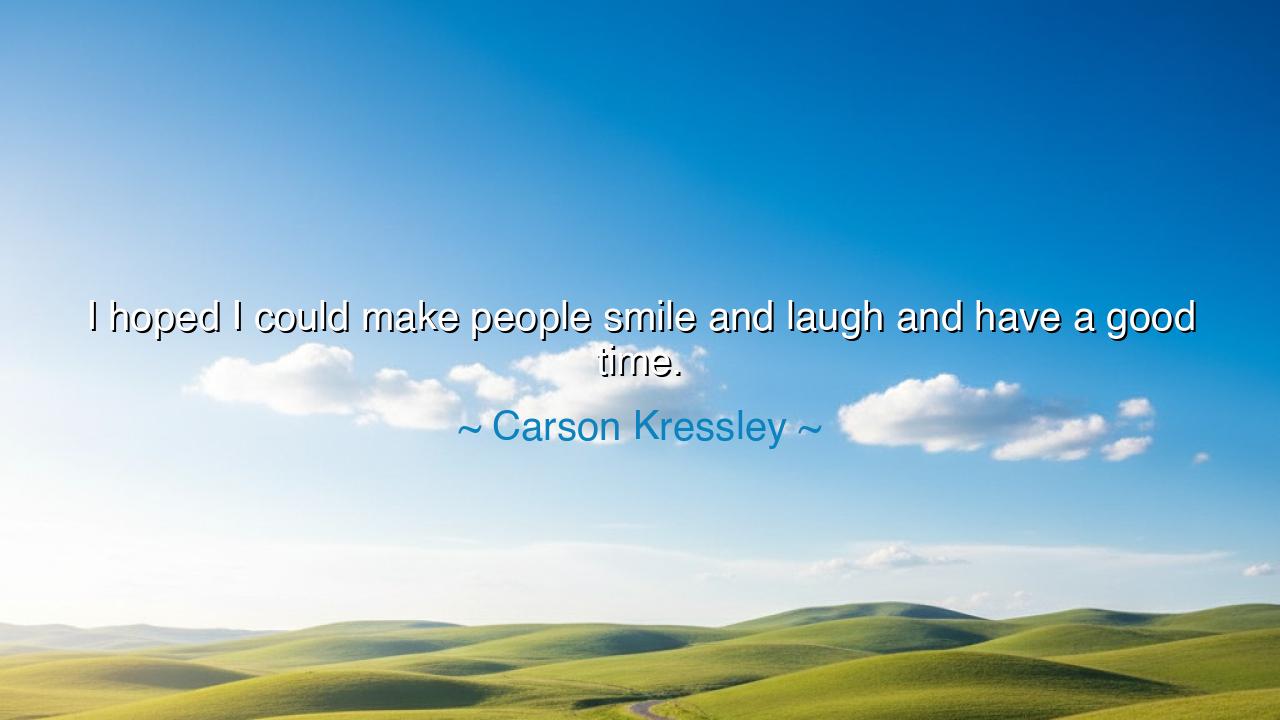
I hoped I could make people smile and laugh and have a good time.






Hear now, O listener, the heartfelt words of Carson Kressley: “I hoped I could make people smile and laugh and have a good time.” Though simple, these words carry the weight of a noble calling, for they reveal a purpose not bound to wealth or power, but to the timeless mission of spreading joy. In this hope lies an ancient truth: that the greatest gift one soul can give another is lightness of heart.
The meaning of this reflection is clear. Carson does not speak of fame, nor of building monuments of glory; he speaks of the sacred simplicity of a smile, of shared laughter, of fleeting moments of delight. To make others feel lighter is to lift the burdens of their journey, even if only for a while. His desire is not to dominate or to impress, but to serve—to use his talents so that others might find comfort, hope, or cheer. Such service is not small; it is the very fabric of community.
The origin of this wisdom reaches back to the earliest fires where stories were told. The jester in the medieval court, the bard singing tales of heroes, the fool who mocked kings—all shared this same duty: to make their people laugh, to bring moments of brightness into the shadows of daily life. In ancient Athens, the comic playwright Aristophanes used humor not only to entertain but to ease the tensions of a society burdened by war and politics. Kressley’s words echo this timeless lineage: to lift hearts through joy is a calling as vital as any.
History offers us countless examples. During World War II, when bombs fell on London, comedians and performers still took to the stage, offering good times to people who feared for their lives. Laughter became not mere amusement, but resistance, a declaration that the human spirit could not be crushed by darkness. In this way, entertainment became a shield, and every smile was a victory over despair. So too does Kressley see his work—as a chance to give people strength through laughter and lightness.
There is humility in this vision. Carson does not boast of changing the world through grand revolutions; instead, he honors the quiet power of small joys. To make someone smile may seem like little, but it can ripple outward, changing the course of a day, and perhaps even the course of a life. A good time, shared with others, can rekindle hope in the weary, soften anger in the embittered, and restore faith in those who have nearly lost it.
Practically, this wisdom invites us to examine our own lives. Each of us has the power to bring joy to those around us—not only through performance, but through kindness, humor, and presence. A shared joke, a gentle word, an act of silliness at the right moment can save another from despair. We need not all stand on a stage; we need only to recognize that in every encounter lies the chance to give another soul the gift of a smile.
So, O listener, take this lesson into your heart: do not underestimate the power of joy. To make others laugh is not frivolous—it is sacred. To give them a good time is not trivial—it is heroic. In a world heavy with burdens, those who carry the torch of humor and kindness are as vital as warriors or kings.
Thus the teaching endures: the hope to make others smile and laugh is not a small dream, but a great one. To live by it is to serve humanity, to lighten the path of others, and to ensure that even in the darkest of nights, there is always room for joy.






AAdministratorAdministrator
Welcome, honored guests. Please leave a comment, we will respond soon